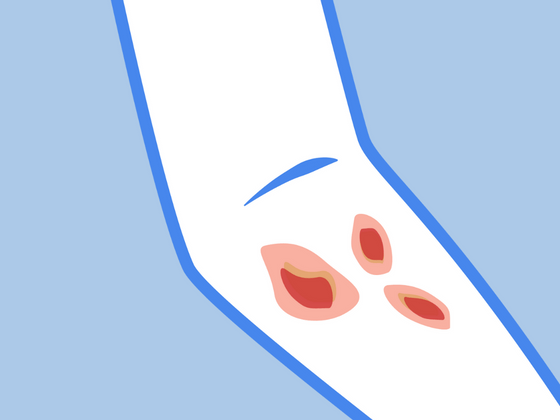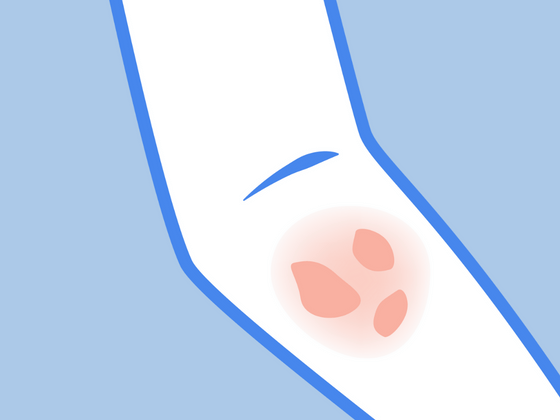With tons of articles out there on home remedies, it’s difficult to pinpoint natural ingredients that work specifically for eczema.
Manuka honey is one of those ingredients that gets thrown around in conversation a lot, but what exactly manuka honey for eczema so special?
Keep reading to discover why you should use Manuka honey on eczema.
Manuka Honey vs. Raw Honey
Honey has been used for centuries as a healing remedy for various ailments like colds, sore throats, skin conditions and more. It has also been used to treat wounds and skin infections due to its antibacterial and antimicrobial properties. Research has shown that wound size decreased significantly when honey was applied to wounds. [1]
But what makes Manuka honey so special? Manuka honey is raw honey, so not pasteurized at high temperatures and thus killing all the medicinal properties. It is made from pollen extracted from the Manuka flower which contains the enzyme Methylglyoxal. This enzyme is completely unique to Manuka honey and provides a high level of peroxide anti-bacterial properties, making it much more powerful healing wise than traditional honey made from clover, buckwheat, spring flowers, etc.
However, not all Manuka honey is made equal. It's important to check the UMF (unique Manuka factor) rating system that categorizes the potency of the honey. KFactor is another system that regulates potency.
Why Use Manuka Honey on Eczema?
So why should you use Manuka honey over other types of honey to heal eczema? Although standard raw honey is beneficial for wound healing, there are additional anti-bacterial properties found in Manuka that can specifically combat staph and other topical infections that eczema patients are prone to. This makes Manuka honey an excellent ingredient in eczema cream formulations.
Manuka honey is also known for restoring moisture to dry, flaky and scaly skin. For additional moisturizing benefits, it can be combined with other natural ingredients like beef tallow cream.
Lastly, Manuka honey offers outstanding wound healing properties. Have you ever tried Manuka honey for scars? It works wonderfully! Hospitals use it for wound dressings and burns.
To be sure you are getting a quality Manuka honey, you want to make sure that there is a minimum rating of 10+ UMF (unique manuka factor) or Kfactor.
Manuka is also widely available in oil form. Similarly to the honey, it is known for having anti-bacterial, anti-fungal and anti-inflammatory properties. However, because it is an essential oil, it is a more concentrated and extremely potent form of Manuka. Looking for a product that contains both Manuka honey and Manuka oil is a great idea, as you'll be using a product that is extremely anti-inflammatory.
If you haven’t discovered our Nourish + Hyrate Manuka Balm, a popular and sticky-free way to apply Manuka honey for eczema, then you’re in for a treat. This cream is not only loved by owner Jennifer Roberge, but by many other eczema sufferers as well.
Here is one of the customer testimonials:
“I've been suffering from eczema ever since I was a kid. But for some reason, it gets worse during Spring/Summer? Probably from the pollen. Anyway, I started using Nourish + Hydrate balm on June 15 and after 3 days, my elbow has been angry, less itchy, and definitely less irritated! I'm really happy to finally try this. I hate using steroid because of the possibility of getting TSW! After a month of just consistent use, my elbow's skin feels flat. No bumps, no redness, no itchiness. Definitely recommend this to everyone!" - Erika
How to Apply Manuka Honey on Eczema?
You can apply Manuka honey directly to the skin, but it can be really sticky and very costly when not diluted a bit. Orally, straight Manuka honey is recommended, but topically, it's a bit of an overkill and diluting it with vitamin rich oils is good for your skin and will save you money and you can avoid a big sticky mess.
Manuka honey in cream form can be applied to either dry or damp skin. Although we find it's best on slightly damp skin as a little bit will go a much longer way and you won't need to replenish your cream as frequently.
We do love creams with Manuka honey for eczema with wet and dry wrapping because they make excellent, nourishing emollients. For your complete eczema skincare routine, consider pairing with gentle eczema soap for cleansing. For your complete eczema skincare routine, consider pairing with gentle eczema soap for cleansing.. Learn more about dry wrapping and wet wrapping.
Where can Manuka honey be applied? Everywhere! But the stickiness makes it less than practical for regular daily use. A big advantage of our Organic Manuka Skin Soothing Cream is that it's creamy, smooth texture is lovely applied anywhere on the entire body, as it is completely all natural, so safe and effective. Need lip and leg skin relief? No problem! It helps both. Works great on eczema on eyelids too!
Give it a try, you'll love it!
Resources
https://www.magonlinelibrary.com/doi/abs/10.12968/...
https://www.ncbi.nlm.nih.gov/pmc/articles/PMC54181...
https://www.sciencedirect.com/science/article/pii/...
https://www.ncbi.nlm.nih.gov/pubmed/22494449
------------------
Bio: Laura is a contributor and content developer for The Eczema Company. She is in no way a medical professional. Her comments, suggestions, and reflections are not intended to replace any medical advice. Always seek the help of a medical professional before undertaking any diet or lifestyle changes.









